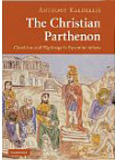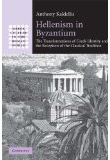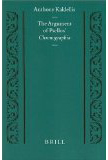Anthony Kaldellis
Publications
Interviews
- I have started a podcast BYZANTIUM & FRIENDS, featuring conversations with colleagues about a host of topics relating to Byzantium and its neighbors.
- Series of podcast interviews on The History of Byzantium podcast with Robin Pierson: Episodes 265, 274, 277-278, 280, 282, 283 (late 2023 to early 2024).
- Podcast interview on The New Books Network, with Charles Coutinho, on The New Roman Empire.
- Podcast interview on Η ιστορία της Ελλάδας, with Alex Katsomitros of Reader.gr, in two parts, available here and here.
- Podcast interview on The Ancient History Podcast, with Owain Williams, regarding The New Roman Empire: A History of Byzantium.
- Podcast interview on Subject to Change with Russell Hogg, Part I available here (30 April, 2024) and Part II available here (4 May, 2024).
- Podcast interview on The New Roman Empire, on the New Books Network Podcasts with Evan Zarkadas.
- Podcast interview, ‘Byzantium and the Specter of Europe,’ Hearth of Hellenis (18 February, 2024).
- Podcast interview, ‘The Secret History, or the Byzantine Gossip Rag,’ The Maniculum Podcast (12 November, 2023).
- Podcast interview on ‘The Byzantines and the Classical Past,’ with Garrett Ryan of the ToldInStone podcast (January 2023).
- Podcast interview about Alexios I Komnenos, with Erlend Hedegart of Well, That Aged Well (April 2021).
- Podcast interview about late antique Athens, with Andrew Schiestel of Ithaca Bound (April 2021).
- Podcast interview about Byzantium and the Roman imagination on the Dumbarton Oaks Byzantine Podcast, with Anna Stavrakopulou and Jake Ransohoff (July 2020).
- Podcast interview about Byzantium Unbound with Danièle Cybulskie of The Medieval Podcast (June 2020).
- Podcast interview about Romanland with Greg Soden of The Classical Ideas Podcast (June 22, 2019).
- Podcast interview about Romanland with Mark Klobas of The New Books Network (June 10, 2019).
- Print interview in Καθημερινή (in Greek) about the Byzantine Parthenon with Antonis Pankratis (Dec 18, 2017).
- Blog interview (in Greek) about Byzantine identity with Andreas Kyropoulos (Nov 14, 2017.
- Podcast interview about Streams of Gold, Rivers of Blood with Mark Klobas of The New Books Network (Aug 23, 2017).
- Podcast interview with Robin Pierson about Streams of Gold, Rivers of Blood (Sept 7, 2017).
- Podcast interview about the Byzantine Republic with Robin Pierson, maker of podcast The History of Byzantium (Nov 12, 2015).
- Print interview about the Byzantine Republic with Tom Jackson of the Sandusky Register (Feb 18, 2015).
- Podcast lecture for the Onassis Foundation on "The Heretical History of the Parthenon" (Jan 10, 2011).
Monographs (including translations)
-

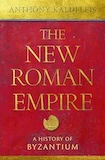
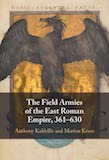


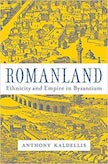
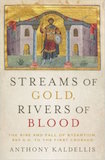
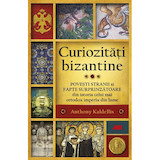
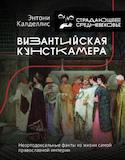

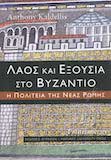
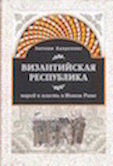
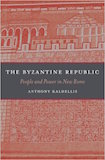
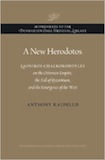
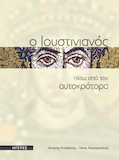
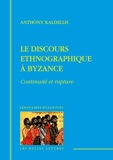
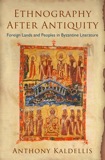

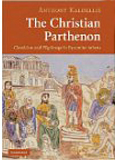
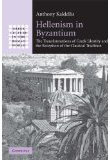

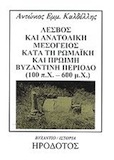

- The Case for East Roman Studies (Leeds: ARC Humanities Press, 2024)
- The New Roman Empire: A History of Byzantium (Oxford: Oxford University Press, 2023).
- The Field Armies of the East Roman Empire, 361-630, co-authored with Marion Kruse (Cambridge: Cambridge University Press, 2023).
- Byzantium Unbound (Leeds: ARC Humanities Press, 2019)
- Romanland: Ethnicity and Empire in Byzantium (Cambridge, MA, and London: The Belknap Press of Harvard University Press, 2019); Turkish translation by Deniz Türker, Bizans: Roma Diyarında Etnisite ve İmparatorluk (Istanbul: Kara Karga Publications, 2020).
- Streams of Gold, Rivers of Blood: The Rise and Fall of Byzantium, 955 A.D. to the First Crusade (Oxford: Oxford University Press, 2017; Onassis Series in Hellenic Culture).
- A Cabinet of Byzantine Curiosities: Strange Tales and Surprising Facts from History's Most Orthodox Empire (New York: Oxford University Press, 2017). Well, this is not a monograph, but I didn't know where else to list it. Russian translation by Andrei Iur’evich Vinogradov, Vizantiiskaia kunstkamera: Neortodoksal’nye fakty iz zhizni samoi pravoslavnoi imperii (Moscow: AST, 2021; series: Istoriia i nauka runeta. Stradaiushchee srednevekov’e, ed. Sergei Ivanov); Romanian translation by Gabriel Tudor, Curiozități bizantine: Povești stranii și fapte surprinzătoare din istoria celui mai ortodox imperiu din lume (Bucarest: Editura ALL, 2021).
- The Byzantine Republic: People and Power in New Rome (Cambridge, MA: Harvard University Press 2015); Russian translation by Vera Zemskova, Византийская Республика: Народ И Власть В Новом Риме (St. Petersburg: Dmitry Bulanin 2016); modern Greek translation by A. Voudouri, Ch. Magoulas, and G. Avramides, Λαός και εξουσία στο Βυζάντιο: Η πολιτεία της Νέας Ρώμης (Athens: Θύραθεν, 2021).
- A New Herodotos: Laonikos Chalkokondyles on the Ottoman Empire, the Fall of Byzantium, and the Emergence of the West (Cambridge, MA: Harvard University Press and Dumbarton Oaks Research Library and Collection 2014 = Dumbarton Oaks Medieval Humanities).
- (with Ilias Anagnostakis) Ιουστινιανός: Πίσω από τον αυτοκράτορα (Athens: Kathimerini 2014; series: Ηγέτες).
- Ethnography after Antiquity: Foreign Lands and People in Byzantine Literature (Philadelphia: University of Pennsylvania Press, 2013; series Empire and After) – shortlisted for the Runciman Award (2014).
- Le discours ethnographique à Byzance: continuité et rupture, tr. C. Messis and P. Odorico (Paris: Les Belles Lettres, 2013 = Séminaires byzantines v. 2).
- The Christian Parthenon: Classicism and Pilgrimage in Byzantine Athens (Cambridge: Cambridge University Press, 2009) – shortlisted for the Runciman Award (2010); tr. modern Greek G. Tzimas, Ο βυζαντινός Παρθενώνας: Η Ακρόπολη ως σημείο συνάντησης χριστιανισμού και ελληνισμού (Athens: Psychogios, 2013).
- Hellenism in Byzantium: The Transformations of Greek Identity and the Reception of the Classical Tradition (Cambridge: Cambridge University Press, 2007; series Greek Culture in the Roman World).
- Procopius of Caesarea: Tyranny, History, and Philosophy at the End of Antiquity (Philadelphia: University of Pennsylvania Press, 2004).
- Λέσβος και ανατολική Μεσόγειος κατά τη ρωμαϊκή και π ρώιμη βυζαντινή περίοδο (100π.Χ – 600μ.Χ.): Μελέτη των κοινωνικών, πολιτικών και θρησκευτικών δομών [Lesbos and the Eastern Mediterranean in the Roman and Early Byzantine Period (100 BC – 600 AD): A Study of Social, Political and Religious Structures] (Thessaloniki: Herodotos, 2002).
- The Argument of Psellos’ Chronographia (Leiden and Boston: E. J. Brill, 1999 = Studien und Texte zur Geistesgeschichte des Mittelalters vol. 68).
Book-Length Translations of Byzantine Sources

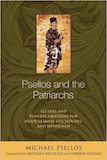
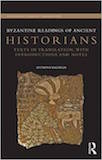
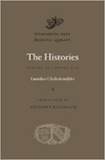
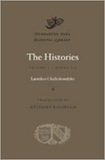
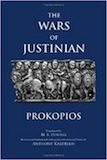
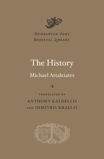
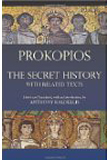
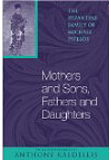
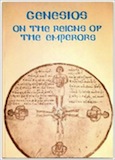
- (with Ioannis Polemis) Saints of Ninth- and Tenth-Century Greece (Cambridge, MA, and London: Harvard University Press = Dumbarton Oaks Medieval Library v. 54, 2019).
- (with Ioannis Polemis) Michael Psellos and the Patriarchs: Letters and Funeral Orations for Keroullarios, Leichoudes, and Xiphilinos (South Bend, IN: Notre Dame University Press 2015).
- Byzantine Readings of Ancient Historians, texts in translation, with introductions and notes (London and New York: Routledge, 2015 = Routledge Classical Translations); Russian translation by Valery Tarasov available here: http://simposium.ru/ru/node/14883.
- Laonikos Chalkokondyles, The Histories (Cambridge, MA, and London: Harvard University Press 2014 = Dumbarton Oaks Medieval Library v. 33-34).
- Prokopios, The Wars, translated by H. B. Dewing, revised and modernized, with an introduction and notes, by Anthony Kaldellis; maps and genealogies by Ian Mladjov (Indianapolis: Hackett Publishing Company, 2014).
- Michael Attaleiates, The History (Cambridge, MA, and London: Harvard University Press 2012 = Dumbarton Oaks Medieval Library v. 16), with D. Krallis.
- Prokopios, The Secret History with Related Texts (Indianapolis: Hackett Publishing Company, 2010).
- Mothers and Sons, Fathers and Daughters: The Byzantine Family of Michael Psellos (South Bend, Ind.: Notre Dame University Press, 2006) with contributions by D. Jenkins and E. Papaioannou.
- Genesios, On the Reigns of the Emperors: introduction, translation, and commentary (Canberra: Australian Association for Byzantine Studies, 1998 = Byzantina Australiensia vol. 11).
Prosopo- graphies
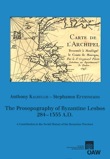
- (co-authored with S. Efthymiades) The Prosopography of Byzantine Lesbos, 284-1355 A.D.: A Contribution to the Social History of the Byzantine Province (Vienna: Verlag der Österreichischen Akademie der Wissenschaften, 2010 = Denkschriften der philosophish-historischen Klasse v. 403 = Veröffentlichungen zur Byzanzforschung v. 22).
Edited Volumes
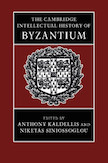

- (co-edited with N. Siniossoglou), The Cambridge Intellectual History of Byzantium (Cambridge: Cambridge University Press, 2017), winner of the 2018 Prose Award in the category Single Volume Reference / Humanities and Social Sciences; Turkish translation of select chapters by Ercan Ertürk, Bizans’ın Entelektüel Tarihi: Seçme Makaleler (Istanbul: Yapı Kredi Publications, 2021).
Articles and Chapters in Books
- Almost all the following articles and chapters can be downloaded from my academia.edu page.
- ‘Gender and the Perception of the Ethnic “Other”,’ in M. Mayer and C. Messis, eds., The Routledge Handbook of Gender and Sexuality in Byzantium (London and New York: Routledge, 2024) 258-270.
- ‘Three Byzantine Theories on the Origin of Political Communities,’ in M.-D. Grigore and V. Makrides, eds., Orthodoxy in the Agora: Orthodox Christian Political Theologies across History (Göttingen: Vanderhoeck and Ruprecht, 2024) 39-52.
- ‘The Price of Admission,’ in B. Anderson and M. Ivanova, eds., Is Byzantine Studies a Colonialist Discipline? Toward a Critical Historiography (University Park, PA: The Pennsylvania State University Press, 2023) 83-89.
- ‘Roman Quasity: A Matrix of Byzantine Thought and History,’ in M. Garani, D. Konstan, and G. Reydams-Schils, eds., The Oxford Handbook of Roman Philosophy (Oxford: Oxford University Press, 2023) 548-567.
- (with Scott Kennedy) ‘Thucydides in Byzantium,’ in P. Low, ed., The Cambridge Companion to Thucydides (Cambridge: Cambridge University Press, 2023) 249-264.
- ‘Byzantine Borders were State Artifacts, not ‘Fluid Zones of Interaction’,’ in D. G. Tor and A. D. Beihammer, eds., The Islamic-Byzantine Border in History: From the Rise of Islam to the End of the Crusades (Edinburgh: Edinburgh University Press, 2023) 100-124.
- ‘Translations into Greek in the Byzantine Period,’ in D. Gutas, ed., with C. Burnett and U. Vagelpohl, Why Translate Science? Documents from Antiquity to the 16th Century in the Historical West (Bactria to the Atlantic) (Leiden: Brill, 2022) 397-444.
- ‘The People of Constantinople,’ in S. Bassett, ed., The Cambridge Companion to Constantinople (Cambridge: Cambridge University Press, 2022) 50-63.
- ‘Provincial Identities in Byzantium,’ in M. E. Stewart, D. A. Parnell, and C. Whately, eds., The Routledge Handbook on Identity in Byzantium (New York: Routledge, 2022) 248-262.
- ‘Alexander the Great in Byzantine Tradition, AD 330-1453,’ in R. Stoneman, ed., A History of Alexander the Great in World Culture (Cambridge: Cambridge University Press, 2022) 216-241.
- ‘The Chronology of the Reign of Alexios III Komnenos for the years 1198-1202 AD and its Implications,’ Byzantina Symmeikta 32 (2022) 59-82.
- ‘Draconic Demons and Ogres: Dragons in Byzantium,’ translated Byzantine texts about dragons in Scott G. Bruce, ed., The Penguin Book of Dragons (Penguin Classics 2021) 117-140.
- ‘The Classicism of Procopius,’ in M. Meier and F. Montinaro, eds., A Companion to Procopius of Caesarea (Leiden and Boston: Brill, 2022) 339-354.
- ‘Civic Identity and Civic Participation in Constantinople,’ in Cédric Brélaz and Els Rose, eds., Civic Identity and Civic Participation in Late Antiquity and the Early Middle Ages (Turnhout: Brepols, 2021 = Cultural Encounters in Late Antiquity and the Middle Ages v. 37) 93-110.
- ‘From “Empire of the Greeks” to “Byzantium”: The Politics of a Modern Paradigm Shift,’ in N. Aschenbrenner and J. Ransohoff, eds., The Invention of Byzantium in Early Modern Europe (Washington, D.C.: Dumbarton Oaks, 2021) 349-367.
- ‘The Reception of Classical Literature and Ancient Myth,’ in S. Papaioannou, ed., The Oxford Handbook of Byzantine Literature (Oxford: Oxford University Press 2021) 162-179.
- ‘The Byzantine Empire (641-1453),’ in P. F. Bang, C. A. Bayly, and W. Scheidel, eds., The Oxford World History of Empire. Volume Two: The History of Empires (Oxford: Oxford University Press 2021) 450-467.
- ‘Byzantine Identity Interrogated, Declared, Activated,’ in M. Panov, ed., Identities: Proceedings of the 7th International Symposium “Days of Justinian I,” Skopje, 15-16 November, 2019 (Skopje 2020) 21-36.
- ‘How Was a ‘New Rome’ Even Thinkable? Premonitions of Constantinople and the Portability of Rome,’ in Y. R. Kim and A. E. T. McLaughlin, eds., Leadership and Community in Late Antiquity: Essays in Honour of Raymond Van Dam (Turnhout: Brepols 2020) 221-247.
- ‘The Politics of Classical Genealogies in the Late Antique Roman East,’ in Ilinca Tanaseanu-Döbler and Leonie von Alvensleben, eds., Athens II: Athens in Late Antiquity (Tübingen: Mohr Siebeck 2020) 259-277.
- ‘The Discontinuous History of Imperial Panegyric in Byzantium and its Reinvention by Michael Psellos,’ Greek, Roman, and Byzantine Studies 59 (2019) 693-713.
- ‘Constantinople’s Belated Hegemony,’ in P. Van Nuffelen, ed., Historiography and Space in Late Antiquity (Cambridge: Cambridge University Press 2019) 14-35.
- ‘Neo-Phoenician Identities in the Roman Empire,’ in C. Lopez-Ruiz and B. Doak, eds., The Oxford Handbook of the Phoenician and Punic Mediterranean (Oxford: Oxford University Press 2019) 685-696.
- ‘Ethnicity and Clothing in Byzantium,’ in K. Durak and I. Jevtić, eds., Identity and the Other in Byzantium: Papers from the Fourth International Sevgi Gönül Byzantine Studies Symposium (Istanbul: Koç University Stavros Niarchos Foundation Center for Antique and Byzantine Studies 2019) 41-52.
- ‘Keroularios in 1054: Nonconfrontational to the Papal Legates and Loyal to the Emperor,’ in Nikolaos G. Chrissis, Athina Kolia-Dermitzaki, and Angeliki Papageorgiou, eds., Byzantium and the West: Perception and Reality (11th-15th C.) (London and New York: Routledge 2019) 9-24.
- ‘Leo I, Ethnic Politics and the Beginning of Justin I’s Career,’ Zbornik radova Vizantološkog instituta 55 (2018) 9-17.
- ‘Political Freedom in Byzantium: The Rhetoric of Liberty and the Periodization of Roman History,’ History of European Ideas 44.6 (2018) 795-811; the issue is republished as an edited volume: V. Arena, ed., Liberty: Ancient Ideas and Modern Perspectives (London: Routledge, 2021).
- ‘Η εθνογένεση των Ρωμαίων της Ανατολής: Πώς είδαν οι Βυζαντινοί τον εκρωμαϊσμό στην αρχαιότητα,’ in O. Katsiardi-Hering et al., eds., Έλλην, Γραικός, Ρωμηός: Συλλογικοί προσδιορισμοί και ταυτότητες (Athens: Eurasia, 2018) 201-213.
- ‘Late Antique Literature in Byzantium,’ in Scott McGill and Edward J. Watts, eds., A Companion to Late Antique Literature (Medford, MA: Wiley-Blackwell, 2018) 557-568.
- ‘Did the Byzantine Empire have “Ecumenical” or “Universal” Aspirations?,’ in C. Ando and S. Richardson, eds., Ancient States and Infrastructural Power: Europe, Asia, and America (Philadelphia: University of Pennsylvania Press, 2017) 272-300.
- ‘The Social Scope of Roman Identity in Byzantium: An Evidence-Based Approach,’ Byzantina Symmeikta 27 (2017) 173-210.
- ‘Epilogue,’ in Christopher Lillington-Martin and Elodie Turqois, eds., Procopius of Caesarea: Literary and Historical Interpretations (Routledge 2017) 261-270.
- ‘How perilous was it to write political history in late antiquity?’ Studies in Late Antiquity 1 (2017) 38-64.
- (with Charis Messis) ‘Conjugal Violence and the Ideological Construction of Byzantine Marriage,’ Limes Plus: Journal of Social Sciences and Humanities 2 (2016) 21-40.
- ‘The Forum of Constantine in Constantinople: What do we know about its original architecture and adornment?’ Greek, Roman, and Byzantine Studies 56 (2016) 714-739.
- ‘The Manufacture of History in the Later Tenth and Eleventh Centuries: Rhetorical Templates and Narrative Ontologies,’ Proceedings of the 23rd International Congress of Byzantine Studies (Belgrade, 22–27 August 2016): Plenary Papers (Belgrade: The Serbian National Committee of AIEB 2016) 293-306.
- ‘Prokopios’ Vandal War: Thematic Trajectories and Hidden Transcripts,’ in S. T. Stevens and J. Conant, eds., North Africa under Byzantium and Early Islam (Washington, D.C: Dumbarton Oaks, 2016) 13-21.
- ‘The Byzantine Conquest of Crete (961 AD), Prokopios’ Vandal War, and the Continuator of the Chronicle of Symeon,’ Byzantine and Modern Greek Studies 39 (2015) 302-311.
- ‘Late Antiquity Dissolves,’ Marginalia, September 18, 2015, available here.
- ‘The Emergence of Literary Fiction in Byzantium and the Paradox of Plausibility,’ in P. Roilos, ed., Medieval Greek Storytelling: Fictionality and Narrative in Byzantium (Wiesbaden: Harrassowitz Verlag 2014 = Mainzer Veröffentlichungen zur Byzantinistik v. 12) 115-130.
- ‘Did Ioannes I Tzimiskes campaign in the east in 974?,’ Byzantion 84 (2014) 235-240.
- ‘The Hagiography of Doubt and Skepticism,’ in S. Efthymiades, eds., The Ashgate Research Companion to Byzantine Hagiography, v. 2 (Ashgate 2014) 453-477. Download pdf here.
- ‘The Making of Hagia Sophia and the Last Pagans of New Rome,’ Journal of Late Antiquity 6 (2014) 347-366.
- (with Ilias Anagnostakis) ‘The Textual Sources for the Peloponnese, A.D. 582–959: Their Creative Engagement with Ancient Literature,’ Greek, Roman, and Byzantine Studies 54 (2014) 105-135, available here.
- ‘The Military Use of the Icon of the Theotokos and its Moral Logic in the Historians of the Ninth-Twelfth Centuries,’ Estudios bizantinos: Revista de la Sociedad Española de Bizantinística 1 (2013) 56-75, available here.
- ‘The Christianization of the Past,’ in A. Drandaki et al., eds., Heaven & Earth: Art of Byzantium from Greek Collections (Athens: Benaki Museum 2013) 44-47. Download pdf here.
- ‘How to Usurp the Throne in Byzantium: The Role of Public Opinion in Sedition and Rebellion,’ in D. G. Angelov and M. Saxby, eds., Power and Subversion in Byzantium: Papers from the Forty-Third Spring Symposium of Byzantine Studies, University of Birmingham, March 2010 (Farnham, UK, and Burglinton, VT: Ashgate, 2013) 43-56.
- ‘The Original Source for Tzimiskes’ Balkan Campaign (971) and the Emperor’s Classicizing Propaganda,’ Byzantine and Modern Greek Studies 37 (2013) 1-18.
- ‘“A Union of Opposites”: The Moral Logic and Corporeal Presence of the Theotokos on the Field of Battle,’ in C. Gastgeber et al., eds., Pour l’amour de Byzance: Hommage à Paolo Odorico (Frankfurt am Main: Peter Lang, 2013) 131-144.
- ‘Byzantine Historical Writing, 500-920,’ in S. Foot and C. Robinson, eds., Oxford History of Historical Writing, v. 2: 400-1400 (Oxford: Oxford University Press, 2012) 201-217.
- ‘The Byzantine Role in the Making of the Corpus of Classical Greek Historiography: A Preliminary Investigation,’ Journal of Hellenic Studies 132 (2012) 71-85. Download pdf here.
- ‘The Greek Sources of Laonikos Chalkokondyles’ Histories,’ Greek, Roman, and Byzantine Studies 52 (2012) 738-765, available here.
- ‘Byzantine Philosophy Inside and Out: Orthodoxy and Dissidence in Counterpoint,’ in K. Ierodiakonou and B. Bydén, eds., The Many Faces of Byzantine Philosophy (Athens: The Norwegian Institute at Athens, 2012 = Papers and Monographs ser. 4, v. 1) 129-151. Download pdf here.
- ‘The Kalends in Byzantium, 400-1200 AD: A New Interpretation,’ Archiv für Religionsgeschichte 13 (2012) 187-203. Download pdf here.
- ‘The Timarion: Toward a Literary Interpretation,’ in P. Odorico, ed., Le face cachée de la litterature byzantine: Le texte en tant que message immediat (Actes du colloque international, Paris 6-7-8 Juin 2008) (Paris: École des hautes études en sciences sociales, Centre d’études byzantines, néo-helléniques et sud-est européennes, 2012 = Dossiers byzantines v. 11) 275-288. Download pdf here.
- ‘Greek Art in Late Antiquity and Byzantium,’ in T. J. Smith and D. Plantzos, eds., A Companion to Greek Art (Malden, MA, and London: Wiley-Blackwell 2012) v. 2, 621-632.
- ‘From Rome to New Rome, From Empire to Nation State: Reopening the Question of Byzantium’s Roman Identity,’ in L. Grig and G. Kelly, eds., Two Romes: Rome and Constantinople in Late Antiquity (Oxford: Oxford University Press, 2012 = Oxford Studies in Late Antiquity) 387-404; Greek tr. A Marinis, ‘Ανοίγοντας ξανά τον φάκελο της ρωμαϊκής ταυτότητας του Βυζαντίου,’ The Books Journal 27 (Jan 2013) 38-43.
- ‘The Interpolations in the Histories of Laonikos Chalkokondyles,’ Greek, Roman, and Byzantine Studies 52 (2012) 259-283, available here.
- ‘The Date of Laonikos Chalkokondyles’ Histories,’ Greek, Roman, and Byzantine Studies 52 (2012) 111-136, available here.
- ‘The date of Psellos’ death, once again: Psellos was not the Michael of Nikomedeia mentioned by Attaleiates,’ Byzantinische Zeitschrift 104 (2011) 649-661. Download pdf here.
- (with C. Lopez-Ruiz), ‘A New Reading of the Stele of Andron (IG II/III 2 10665): Only one son died, not two,’ Zeitschrift für Papyrologie und Epigraphik 176 (2011) 57-59.
- ‘Aristotle’s Politics in Byzantium,’ in V. Syros, ed., Well Begun is Only Half Done: Tracing Aristotle’s Political Ideas in Medieval Arabic, Syriac, Byzantine, Jewish, and Indo-Persian Sources (Tempe, AZ: Arizona State University Press, 2011 = Medieval and Renaissance Texts and Studies v. 388 = Medieval Confluences Series v. 1) 121-143; Greek translation by N. Tagoulis and I. Tripoula, ‘Ο αριστοτελικός πολιτικός στοχασμός στις μεσαιωνικές αραβικές, συριακές, βυζαντινές και εβραϊκές παραδόσεις,’ in V. Syros and G. Steiris, ed., Τα Πολιτικά του Αριστοτέλη στο Βυζάντιο (Athens: Kardamitsa 2021) 153-161.
- ‘Prokopios’ Persian War: A Thematic and Literary Analysis,’ in R. Macrides, ed., History as Literature in Byzantium (Aldershot: Ashgate, 2010) 253-273.
- ‘The Study of Women and Children: Methodological Challenges and New Directions,’ in P. Stephenson, ed., The Byzantine World (London: Routledge, 2010) 61-71.
- ‘The Corpus of Byzantine Historiography: An Interpretive Essay,’ in P. Stephenson, ed., The Byzantine World (London: Routledge, 2010) 211-222.
- ‘The Great Medieval Mythogenesis: Why Historians Should Look Again at Medieval Heroic Tales,’ in U. Dill and C. Walde, eds., Antike Mythen: Medien, Transformationen und Konstruktionen (Berlin and New York: W. de Gruyter, 2009) 356-371.
- ‘Niketas Choniates: Paradox, Reversal, and the Meaning of History,’ in A. Simpson and S. Efthymiades, eds., Niketas Choniates: A Historian and a Writer (Geneva: Pomme d’Or, 2009) 75-99. Download pdf here.
- ‘The Date and Structure of Prokopios’ Secret History and his Projected Work on Church History,’ Greek, Roman, and Byzantine Studies 49 (2009) 585-616.
- ‘Classical Scholarship in Twelfth-Century Byzantium,’ in C. Barber and D. Jenkins, eds., Medieval Greek Commentaries on the Nicomachean Ethics (Leiden and Boston: E. J. Brill, 2009 = Studien und Texten zur Geistesgeschichte des Mittelalters v. 101) 1-43.
- ‘Lesbos in Late Antiquity: Live Evidence and New Models for Religious Change,’ in W. Caraher, L. J. Hall, and R. S. Moore, eds., Archaeology and History in Medieval and Post-Medieval Greece: Studies on Method and Meaning in Honor of Timothy E. Gregory (Aldershot: Ashgate, 2008) 155-167.
- ‘Historicism in Byzantine Thought and Literature,’ Dumbarton Oaks Papers 61 (2008) 1-24.
- ‘The Literature of Plague and the Anxieties of Piety in Sixth-Century Byzantium,’ in F. Mormando and T. Worcester, eds., Piety and Plague: From Byzantium to the Baroque (Kirksville, MO: Truman State University Press, 2007) 1-22. Download pdf here. Greek translation by Ch. Makrypoulias, ‘Η φιλολογία του λοιμού και οι αγωνίες της ευσέβειας στο Βυζάντιο του έκτου αιώνα,᾽ in Γ. Ν. Δελιγιαννάκης, Τί είναι ύστερη αρχαιότητα; Συναγωγή μελετών για τον υστερορωμαϊκό κόσμο (Αθήνα: Ηρόδοτος 2020) 467-506.
- ‘Christodoros on the Statues of the Zeuxippos Baths: A New Reading of the Ekphrasis,’ Greek, Roman, and Byzantine Studies 47 (2007) 361-383, available here.
- ‘A Byzantine Argument for the Equivalence of All Religions: Michael Attaleiates on Ancient and Modern Romans,’ International Journal of the Classical Tradition 14 (2007) 1-22.
- ‘Thoughts on the Future of Psellos-Studies, with Attention to his Mother’s Encomium,’ in C. Barber and D. Jenkins, eds., Reading Michael Psellos (Leiden: E. J. Brill, 2006 = The Medieval Mediterranean v. 61) 229-245.
- (and S. Efthymiades), ‘Τὸ προσωπογραφικὸ λεξικὸ τῆς βυζαντινῆς Λέσβου (284-1355) [The Prosopographical Lexikon of Byzantine Lesbos],’ Ἁγία Σιών: Ἐπιστημονική Ἐπετηρίς Ἱερᾶς Μητροπόλεως Μυτιλήνης, Ἐρεσοῦ καί Πλωμαρίου 1 (2006) 183-186.
- ‘Julian, the Hierophant of Eleusis, and the Abolition of Constantius’ Tyranny,’ Classical Quarterly 55 (2005) 652-655.
- ‘The Date of Psellos’ Theological Lectures and Higher Religious Education in Constantinople,’ Byzantinoslavica 63 (2005) 143-151.
- ‘The Works and Days of Hesychios the Illoustrios of Miletos,’ Greek, Roman, and Byzantine Studies 45 (2005) 381-403, available here.
- ‘Republican Theory and Political Dissidence in Ioannes Lydos,’ Byzantine and Modern Greek Studies 29 (2005) 1-16.
- ‘Classicism, Barbarism, and Warfare: Prokopios and the Conservative Reaction to Later Roman Military Policy,’ American Journal of Ancient History n.s. 3-4 (2004-2005 [2007]) 189-218.
- ‘Identifying Dissident Circles in Sixth-Century Byzantium: The Friendship of Prokopios and Ioannes Lydos,’ Florilegium 21 (2004) 1-17.
- ‘The Religion of Ioannes Lydos,’ Phoenix 57 (2003) 300-316. Download pdf here.
- ‘Συμμετεῖχαν στἠν Α´ Οἰκουμενική Σύνοδο τῆς Νίκαιας (325 µ.Χ.) ἐπίσκοποι τῆς Μυτιλήνης καί τῆς Μηθύμνης; [Did Bishops of Mytilene and Methymna Participate in the First Ecumenical Council of Nikaia (325 AD)?]’ Ὁ Ποιμῆν: Μηνιαίον ἐκκλησιαστικὸν περιοδικὸν (Μυτιλήνη) Oct.-Nov. (2003) 190-193 = Ἁγία Σιών: Ἐπιστημονική Ἐπετηρίς Ἱερᾶς Μητροπόλεως Μυτιλήνης, Ἐρεσοῦ καί Πλωμαρίου 1 (2006) 100-103.
- ‘Things Are Not What They Are: Agathias Mythistoricus and the Last Laugh of Classical Culture,’ Classical Quarterly 53 (2003) 295-300.
- ‘Notes on the Topography and History of Byzantine Lesbos,’ Jahrbuch der österreichischen Byzantinistik 51 (2001) 61-72.
- ‘The Historical and Religious Views of Agathias: A Reinterpretation,’ Byzantion 69 (1999) 206-252.
- ‘Agathias on History and Poetry,’ Greek, Roman, and Byzantine Studies 38 (1997) 295-305.
Brill's New Jacoby
- (texts, translations, and commentaries for all authors available at brillonline.nl)
- Theophanes of Mytilene (FGrH 188), Kallistion (223), Kallinikos Soutorios (281), Klaudianos (282), Christodoros of Koptos (283), Hesychios of Miletos (390), Skamon of Mytilene (476), Myrsilos of Methymna (477), Theolytos of Methymna (478), Anonymoi of Lesbos (479), Aelios Dios (629), Kandidos (748), Kapiton (750), Dios (785), Hestiaios (786), Philostratos (789), Philon of Byblos (790) (the last one co-authored with C. Lopez Ruiz).
Reviews
- G. Dagron and B. Flusin, Constantin VII Porphyrogénète: Le livre des cérémonies (Paris: Association des Amis du Centre d’Histoire et Civilisation de Byzance, 2020)’ in Bryn Mawr Classical Review 2021.04.27, available here.
- M. D. Lauxtermann, Byzantine Poetry from Pisides to Geometres: Texts and Contexts. Volumes 1-2. Wiener byzantinische Studien 24/1-2 (Vienna: Austrian Academy of Sciences Press, 2003-2019)’ in Bryn Mawr Classical Review 2021.02.32, available here.
- J. Herrin, Ravenna: Capital of Empire, Crucible of Europe (Princeton 2020), in the Wall Street Journal, Dec. 11, 2020.
- S. Papaioannou, ed., Michael Psellus: Epistulae (Teubner 2019), in Bryn Mawr Classical Review 2020.10.64, available here.
- S. Smith, Greek Epigram and Byzantine Culture: Gender, Desire, and Denial in the Age of Justinian (Cambridge 2019), in Classical Philology 115.3 (2020) 601-605.
- W. Pohl, C. Gantner, C. Grifoni, and M. Pollheimer-Mohaupt, eds., Transformations of Romanness: Early Medieval Regions and Identities (Brill 2018), in Gnomon 92.5 (2020) 436-441.
- M. Humphries, Cities and the Meanings of Late Antiquity (Brill 2019), in Bryn Mawr Classical Review 2020.04.45, available here.
- A. Németh, The Excerpta Constantiniana and the Byzantine Appropriation of the Past (Cambridge University Press 2018), in Sehepunkte: Rezensions Journal für der Geschichtswissenschaften 19 (2019) no. 11, available here.
- S. Eshel, The Concept of the Elect Nation in Byzantium (Brill 2018), in Byzantinische Zeitschrift 111.3 (2018) 809-834.
- A. Sarantis, Justinian’s Balkan Wars: Campaigning, Diplomacy and Development in Illyricum, Thrace and the Northern World, A.D. 527-65 (Francis Cairns 2016), in Speculum 93 (2017) 894-895.
- J. Harris, The Lost World of Byzantium (Yale University Press 2015), in The Medieval Review 16.03.04.
- A. Cameron, Byzantine Matters (Princeton 2014), in Journal of Late Antiquity 7 (2014) 376-378.
- C. A. Bandy, ed. and tr., Ioannes Lydus, On the Months (Edwin Mellen Press 2013), in Bryn Mawr Classical Review 2014.01.09, available here.
- P. Armstrong, ed., Authority in Byzantium (Ashgate 2013), in Speculum 89 (2014) 156-157.
- J. Herrin, Margins and Metropolis: Authority across the Byzantine Empire (Princeton 2013), in Journal of Late Antiquity 6 (2014) 372-373.
- E. D. Digeser, A Threat to Public Piety: Christians, Platonists, and the Great Persecution (Ithaca: Cornell University Press, 2012), in the American Historical Review 118 (2013) 914-915.
- L. James, ed., Constantine of Rhodes, On Constantinople and the Church of the Holy Apostles (Aldershot and Malden, MA: Ashgate 2013), in Bryn Mawr Classical Review 2013.04.59, available here.
- P. Van Deun and C. Macé, eds., Encyclopedic Trends in Byzantium? (Leuven, Paris, Walpole, MA: Peeters and Department of Oriental Studies, 2011), in The Medieval Review 12.10.30, available here.
- I. Ševčenko, ed., Chronographiae quae Theophanis Continuati nomine fertur liber quo Vita Basilii imperatoris amplectitur (Berlin: De Gruyter, 2011), in Bryn Mawr Classical Review 2012.04.25, available here.
- J. R. Ryder, The Career and Writings of Demetrius Kydones: A Study of Fourteenth-Century Byzantine Politics, Religion and Society (Leiden and Boston: Brill, 2010), in The Medieval Review 11.10.02, available here.
- J. Howard-Johnston, Witnesses to a World Crisis: Historians and Histories of the Middle East in the Seventh Century (Oxford: Oxford University Press, 2010), in Bryn Mawr Classical Review 2010.12.24, available here.
- D. M. Metcalf, Byzantine Cyprus, 491-1191 (Nicosia: Cyprus Research Center, 2010), in Speculum, 86 (2011) 530-532.
- E. Luttwak, The Grand Strategy of the Byzantine Empire (Cambridge, MA: Harvard University Press, 2009), in Bryn Mawr Classical Review 2010.01.49, available here.
- T. Banchich and E. Lane, The History of Zonaras from Alexander Severus to the Death of Theodosius the Great (New York and London: Routledge, 2009), in Bryn Mawr Classical Review 2010.01.30, available here.
- G. Page, Being Byzantine: Greek Identity before the Ottomans (Cambridge: Cambridge University Press, 2008), in Medieval Review 09.04.10, available here.
- P. Sarris, Economy and Society in the Age of Justinian (Cambridge: Cambridge University Press, 2006), in Phoenix 63 (2009) 206-208.
- H. Börm, Prokop und die Perser: Untersuchungen zu den römisch-sasanidischen Kontakten in der ausgehenden Spätantike (Stuttgart: Steiner, 2007), in Byzantinische Zeitschrift 101 (2008) 806-811.
- L. K. Little, ed., Plague and the End of Antiquity: The Pandemic of 541-750 (Cambridge: Cambridge University Press, 2007), and W. Rosen, Justinian’s Flea: Plague, Empire, and the Birth of Europe (New York: Viking, 2007), in Journal of Late Antiquity 1 (2008) 407-410.
- R. Macrides, George Akropolites, The History (Oxford: Oxford University Press, 2007), in Speculum 83 (2008) 459-460.
- E. Watts, City and School in Late Antique Athens and Alexandria (Berkeley: University of California Press, 2006), in Anglo-Hellenic Review 35 (2007) 19.
- P. Moore, Iter Psellianum (Toronto: Pontifical Institute of Mediaeval Studies, 2005), in Byzantinische Zeitschrift 99 (2006) 257-260.
- G. Dagron, Emperor and Priest: The Imperial Office in Byzantium (Cambridge: Cambridge University Press, 2003), in Ancient History Bulletin 19 (2005) 97-101.
- M. Maas, ed., The Cambridge Companion to the Age of Justinian (Cambridge: Cambridge University Press, 2005), in The Medieval Review 06.01.25, available here.
- J. Harris, ed., Palgrave Advances in Byzantine History (New York: Palgrave, 2005), in Canadio-Byzantina 17 (2006) 14-16.
- G. Greatrex and S. N. C. Lieu, ed., The Roman Eastern Frontier and the Persian Wars. Part II: AD 363-630. A Narrative Sourcebook (London: Routledge, 2002), in Byzantine and Modern Greek Studies 29 (2005) 239-240.
- D. Stathakopoulos, Famine and Pestilence in the Late Roman and Early Byzantine Empire (Aldershot: Ashgate, 2004), in Byzantine and Modern Greek Studies 29 (2005) 111-112.
- J. W. Birkenmeier, The Development of the Komnenian Army: 1081-1180 (Leiden and Boston: Brill, 2002)’ in Byzantine and Modern Greek Studies 29 (2005) 91-93.
- (co-authored with Mary Pittas-Herschbach, Gonda Van Steen, and Andrew W. White), Review of M. Plorites, Το θέατρο στο Βυζάντιο (Athens: Kastaniotes, 1999); I. Vivilakes, Ἡ θεατρική ὁρολογία στούς Πατέρες τῆς Ἐκκλησίας: Συμβολή στή μελέτη τῆς σχέσεως Ἐκκλησίας και θεάτρου (University of Athens: PhD Dissertation, 1996); W. Puchner, Τὸ Βυζαντινὸ θέατρο (Nicosia: Κέντρον ἐπιστημονικῶν ἐρευνῶν, Ἐπετηρίς 11 [1982] 169-274), in Text and Presentation: Journal of the Comparative Drama Conference 23 (2002) 162-167.
Encyclopedia Entries
- ‘Byzantine Empire, 1.: 330-650,’ in John M. MacKenzie, ed., The Encyclopedia of Empire (Wiley-Blackwell 2016) online and hard copy.
- The Oxford Dictionary of Late Antiquity (Oxford: Oxford University Press) volume in preparartion: entries on Christodorus of Coptos; Delphi; Eleusis; and Mytilene.
- G. Giannakis, ed., Encyclopedia of Ancient Greek Language and Linguistics (Leiden: Brill, 2014): entry on ‘The Byzantine Phase and Reception of Ancient Greek.’
- T. Lounghis, ed., with E. Kislinger, Βυζάντιο: Ιστορία και πολιτισμός. Ερευνητικά πορίσματα, v. 1 (Athens: Herodotos, 2014): entries on ‘Προκόπιος’ (205-208), ‘Αγαθίας’ (209-210), ‘Λόγιοι της αυτοκρατορίας της Νίκαιας’ (325-336), and ‘Γεώργιος Ακροπολίτης’ (337-340).
- M. Finkelberg, ed., The Homer Encyclopedia (Oxford: Blackwell, 2011) entries on ‘Centos’ (v. 1, 156-157), ‘Reception, Early Christian’ (v. 3, 714-716), ‘Scholarship, Byzantine’ (v. 3, 768-770), and ‘Transliteration of Books’ (v. 3, 886-887).
- M. Gagarin, ed., Encyclopedia of Ancient Greece and Rome (Oxford: Oxford University Press, 2009): entries on ‘Chios’ (v. 2, 89-90), ‘Classical Scholarship: Byzantium’ (v. 2, 173-175), ‘Lesbos’ (v. 4, 239-240), ‘Naxos’ (v. 5, 54-55), and ‘Samothrace’ (v. 6, 205-206).’
This site created 2010, copyright Anthony Kaldellis. Contact him at [email protected].
